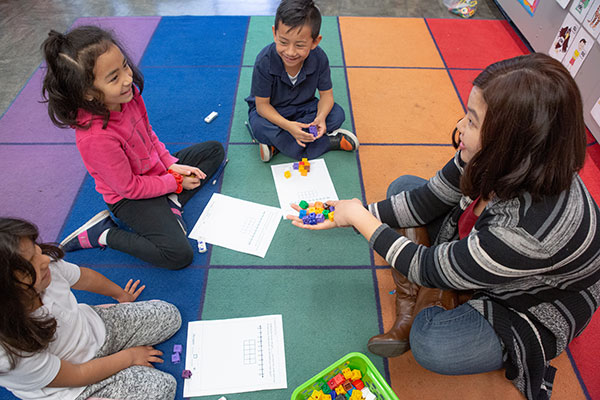The mission of the California Mathematics Project (CMP) is to develop and enhance K-12 teachers’ content knowledge and instructional strategies aligned with the California State Board of Education adopted California Mathematics Content Standards and Framework.
These goals are at the center of every California Mathematics Project program:
- Provide teachers with effective instructional strategies to ensure their students develop a deep, robust understanding of mathematics.
- Learning to establish the culture, conditions, and competencies that help students develop a keen sense that mathematics is coherent and rooted in cultural beliefs and values, as well as a belief that mathematics is doable.
- Learning teacher moves, instructional strategies, and routines that ensure access for ALL students (e.g., ELs, Special Ed, low-income, etc.).
- Provide teachers with significant sense-making experiences in mathematics.
- Developing teacher content knowledge
- Modeling coherent learning experiences in ways that teachers can replicate in their classrooms.
- Experiencing being a learner of mathematics.
- Develop teachers’ leadership potential to advocate for and deliver rigorous and relevant mathematics education at all levels.
- Developing leadership skills (e.g., active listening, making requests, making agreements, dealing with broken agreements, managing difficult conversations, communicating with various audiences, creating allies, etc.).
- Learning to design and provide professional growth experiences for colleagues.
- Understanding the “Taking Action” chapter of Principles to Action, or a similar model that prompts leadership action.
- Assess the Impact of Professional Development that goes beyond customer satisfaction surveys.
- Determining the extent to which activities advance each of goals 1-3 above.
- Determining whether all the activities connected to goals 1-3 make a difference in instruction.
- Asking participants some time after a Professional Development session how they have used what they learned in the institute.
- Collecting artifacts of student work that provide evidence that instruction was influenced by the Professional Development session.


Photos by Allison Shelley for EDUimages
California Mathematics Project Core Values Statement:
- Ongoing access to an engaging and humanizing mathematical education—a socio-cultural, human endeavor with emphasis on communicating, connecting, and valuing mathematical ideas to describe the world—is a universal right, central among civil rights.
- ALL students must be provided with a mathematical education that allows them to make sense of the world quantitatively and to appreciate their own power to reason. This includes making sense of mathematics through active engagement in problem solving and grappling with increasingly challenging tasks in an interactive way, where challenging and critiquing the thinking of others is safe and valued.
- ALL teachers must have their own significant sense-making experiences in mathematics to provide similar experiences for their students. All teachers have the potential to be leaders and a responsibility to advocate for rigorous and relevant mathematics education at all levels. Above all, they must help their students develop an understanding that mathematics is coherent, rooted in cultural beliefs and values, and doable.

Photo by Allison Shelley/The Verbatim Agency for EDUimages
The California Mathematics Project supports 19 regional sites located on University of California (UC), California State University (CSU), and independent college and university campuses to provide programs that strengthen teaching and learning in mathematics. The California Mathematics Project is one of the nine subject disciplines that comprise the California Subject Matter Project (CSMP). The CSMP is supported by the state of California and is administered by the University of California Office of the President. All CSMP disciplines share common goals and program elements to further their mandate in providing professional and leadership development for K-12 teachers throughout the state.
